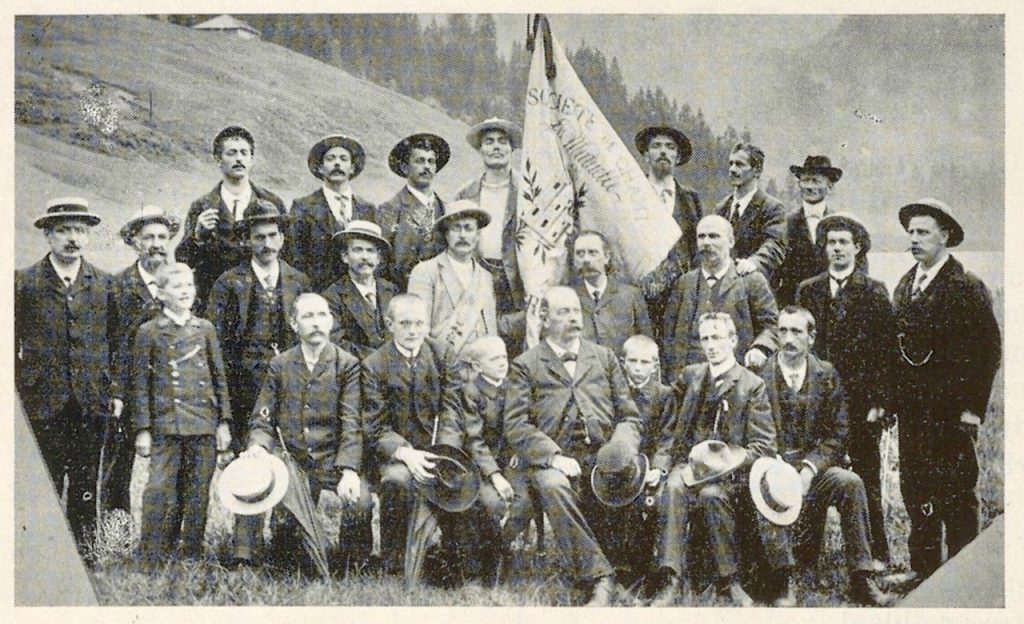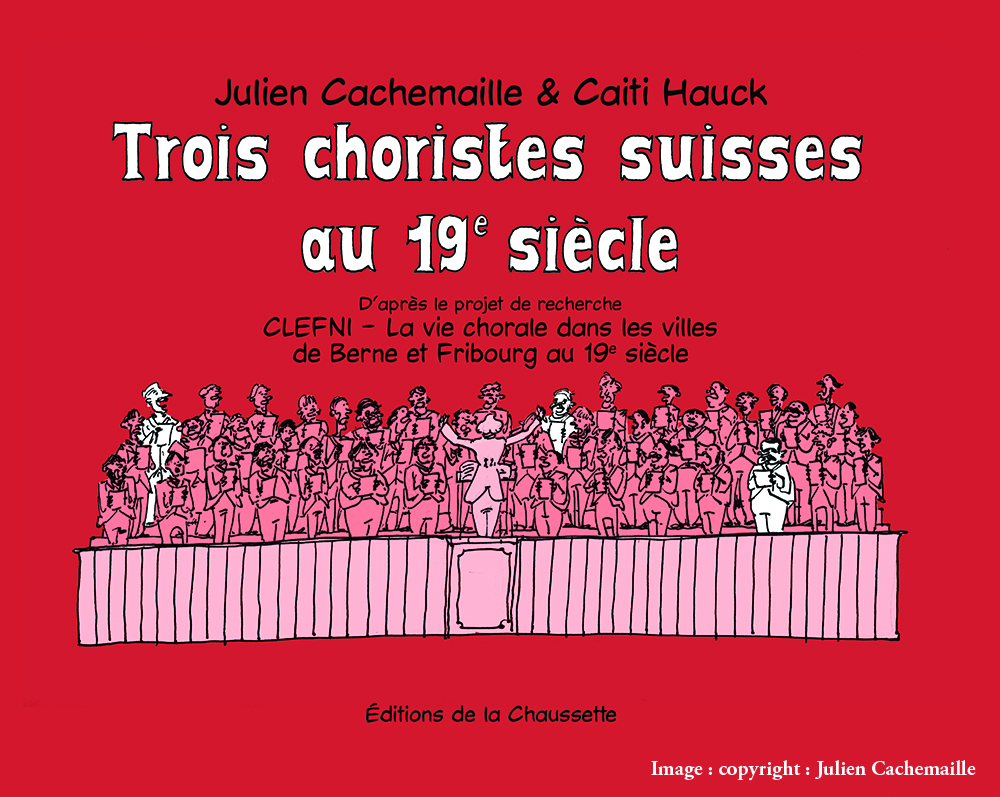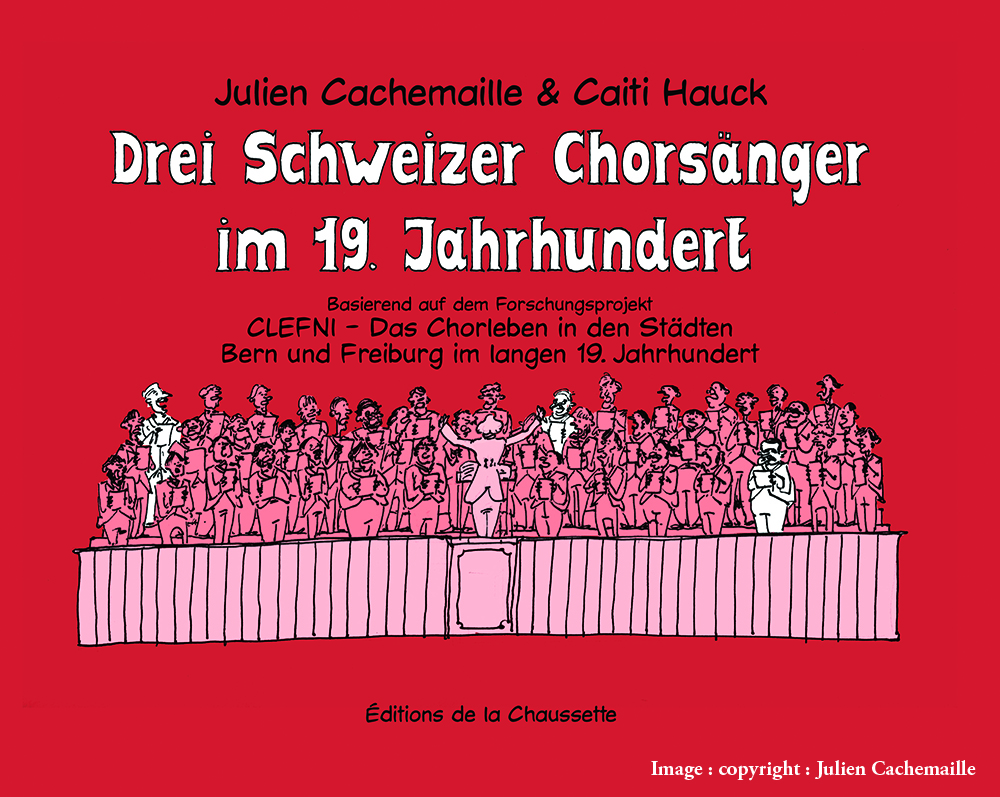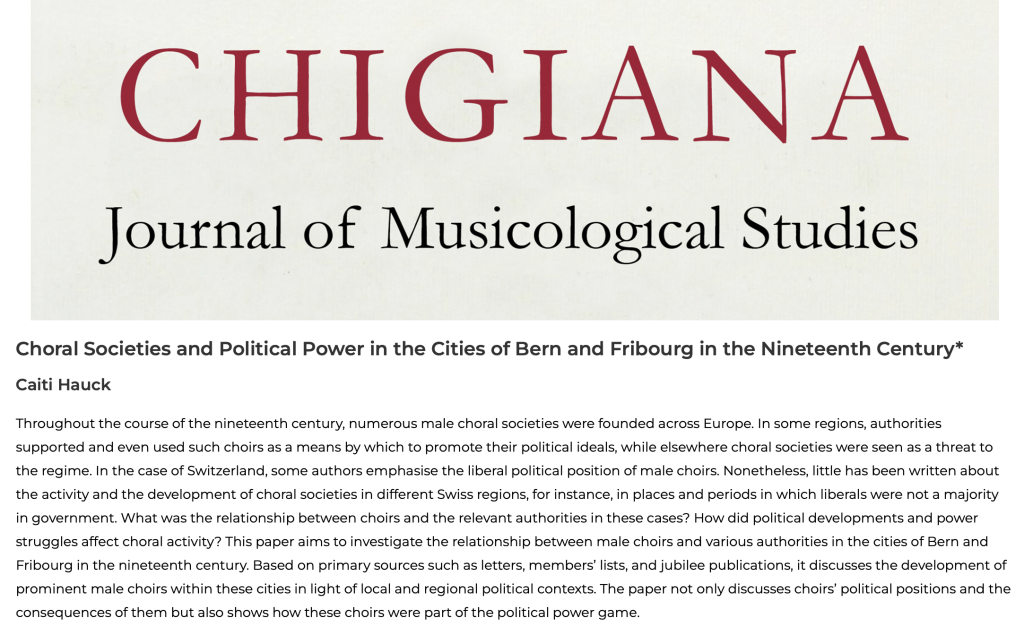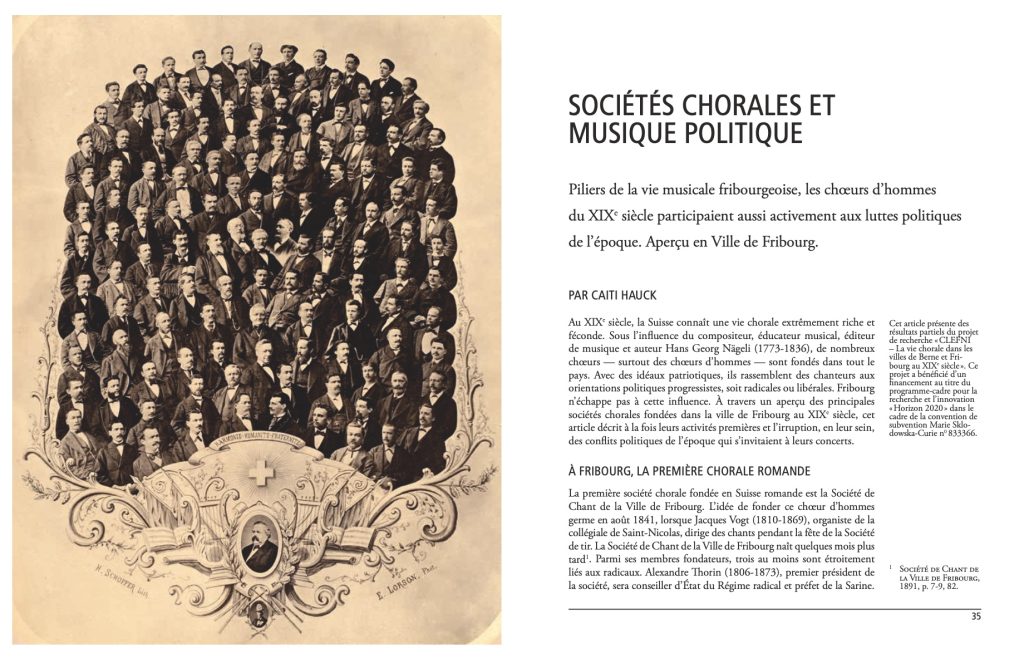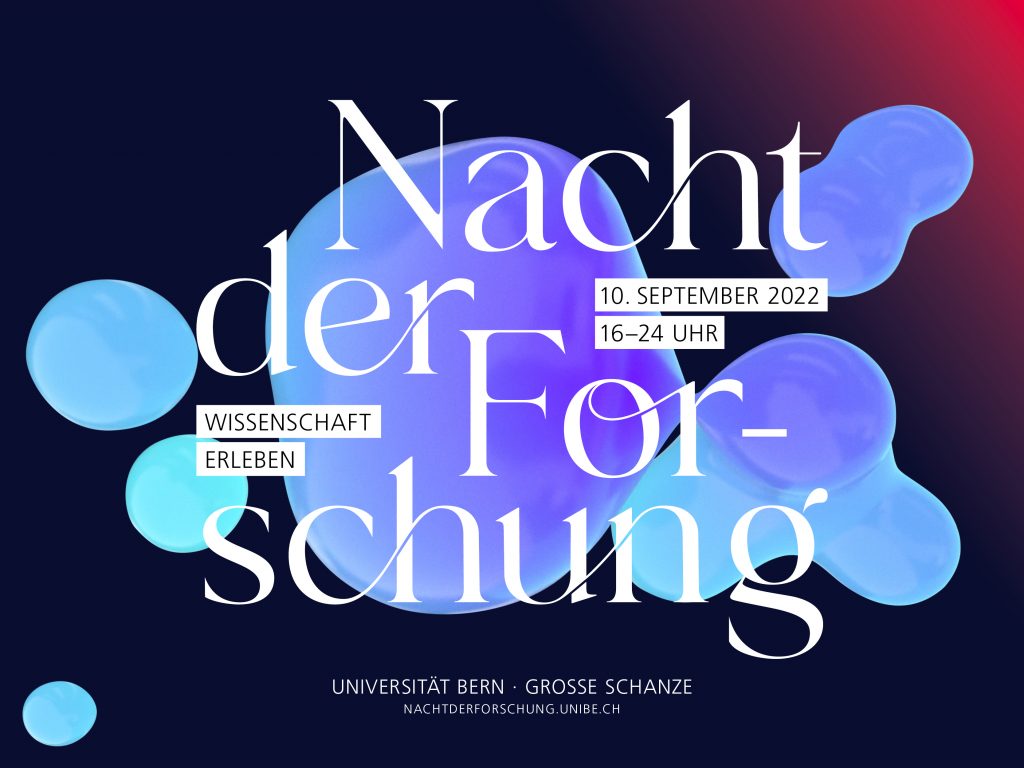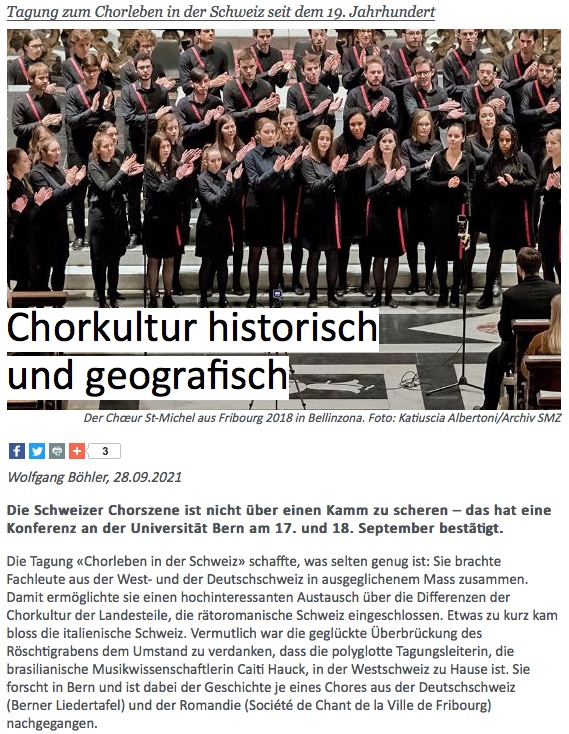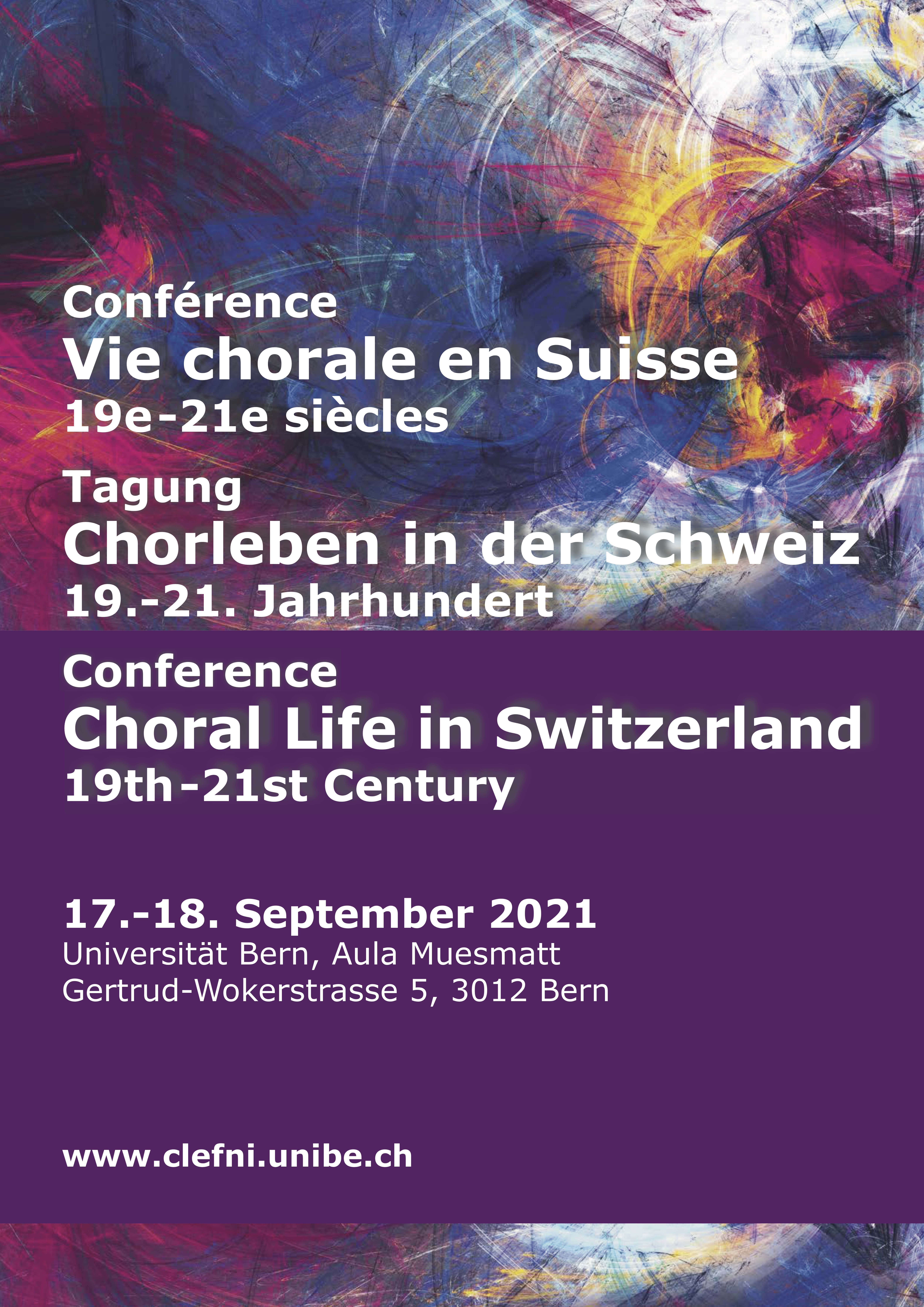-
Comic book offers new insights into 19th-century choral life in Bern and Fribourg
“Wie Männerchöre die Schweiz vereinten” — read the article about the comic on uniAKTUELL, the online magazine of the University of Bern!
The comic book “Three Swiss choristers in the 19th century”, the result of a collaboration between the cartoonist Julien Cachemaille and the musicologist Caiti Hauck, is now available!
Based on the CLEFNI research project, this comic book plunges you into the world of men’s choirs of the time, with patriotic songs, singing festivals and excursions to discover the beauty of Switzerland. Beyond the clichés, these three stories reveal not only the role played by these choirs in the political, social and cultural life of our country, but also how they contributed to the construction of modern Switzerland.
The comic book is available in French and German. You can download it free of charge in PDF format or order a printed version.
Order a printed copy in French
Order a printed copy in German
The comic in the media:
- Radio SRF, Musikmagazin (June 2025): Neuerscheinungen
- La Région (June 2025): L’histoire chorale en bande dessinée
- Le Tapa-Sabllia, Bulletin d’information de la Commune d’Yvonand (April 2025): Bande dessinée : Trois choristes suisses au 19e siècle
- Radio SRF, Fiirabigmusig (April 2025): Schweizer Chöre singen
- Swiss Musical Journal (March 2025): Publications on Swiss choral life
- myScience (March 2025): Wegweisende Publikationen zum Schweizer Chorleben
-
Edited volume on Swiss choral life
The openaccess book Schweizer Chorleben seit 1800: Musik, Praxis und Kontexte = Vie chorale en Suisse depuis 1800 : Musiques, pratiques et contextes, edited by Caiti Hauck and Cristina Urchueguia, is out now!
The book is published by Bern Open Publishing and can be downloaded for free.
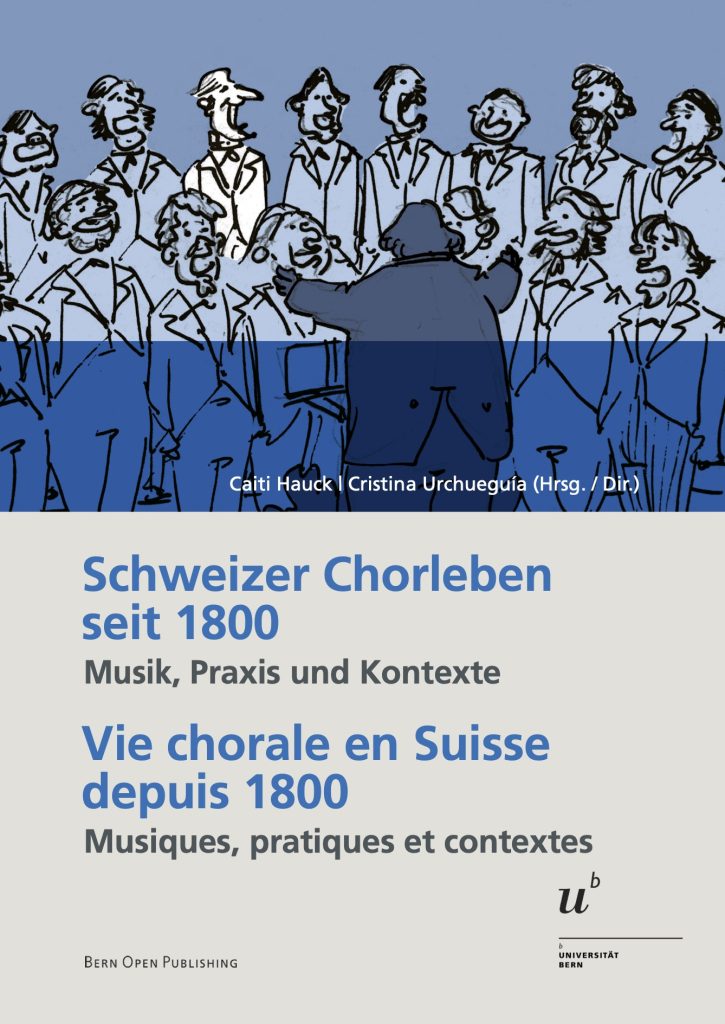
Cover image by Julien Cachemaille
Table of contents
Vorwort / Avant-propos
CAITI HAUCKKonzertbericht: «Schweizer Vokalmusik vom 19. – 21. Jahrhundert» – Anmerkungen zu Programm, den Auftragskompositionen und Konzerten
WILLI DERUNGSDie Schweizerische Musikgesellschaft (1808-1891): Ausstrahlung, Repertoire, soziale und politische Implikationen
CLAUDIO BACCIAGALUPPILe chant choral à la Société de musique de Genève (1823-1839), un laboratoire social
IRÈNE MINDER-JEANNERETGesangsvereine und Netzwerk im langen 19. Jahrhundert: die Städte Bern und Freiburg als Fallstudien
CAITI HAUCKPicturing the Singing Nation: The Swiss Federal Singing Festivals in the Nineteenth Century
ANTONIO BALDASSARREDer Männergesangverein soll «das Volkslied pflegen»
Zur Kritik des Deutschen Kaisers Wilhelm II. 1903 an der Entwicklung des Männerchorwesens und zu den Konsequenzen für die Amateurchorkultur insbesondere in Deutschland und in der Schweiz
FRIEDHELM BRUSNIAKDas Chorwerk von Othmar Schoeck: von der Postromantik zur Avantgarde und darüber hinaus
BEAT FÖLLMIChœur du peuple et théâtre populaire au Théâtre du Jorat
DELPHINE VINCENT
Das Bühnenschaffen von Gion Antoni Derungs – eine verspätete Nationaloper?
THOMAS GARTMANNStimmen, die ‹wie Silberfäden leuchten› – Die Choralschola des Klosters Einsiedeln und ihre Interpretationspraxis
STEPHAN KLAREREine Chorgründung aus dem Geist des Kulturprotestantismus: Adolf Hamm und der Basler Bach-Chor
DOMINIK SACKMANNZur Geschichte professioneller Chöre in der Schweiz: der Schweizer Kammerchor 1997 bis 2011
LUKAS NÄFThe Choir as a Pivotal Element in the Synthesis of Language and Sound: Ulrich Rasche’s Musical Theatre
KATELYN ROSE KINGAu c(h)oeur de la Fête des Vignerons 2019
NOÉMIE FAVENNEC -
New article available on open access
A new article presenting some of the results of CLEFNI is now openly accessible.
The latest volume of the Chigiana Journal of Musicological Studies features a dossier on Music and power in the long nineteenth century.
In the article “Choral societies and political power in the cities of Bern and Fribourg in the 19th century”, Caiti Hauck describes some of the activities of the male choirs Société de Chant de la Ville de Fribourg, Berner Liedertafel and Cäcilienverein Freiburg during the 19th century and sheds light on their relations with the political power of the time.
The article is freely available on the BORIS portal of the University of Bern.
Many thanks to the editors for their kind permission to make the article open access!
-
Article with partial results of CLEFNI available on open access
A dossier on choral singing in the Canton of Fribourg is the highlight of the 2022 Annales Fribourgeoises, published by the Société d’histoire du canton de Fribourg.
In the article “Sociétés chorales et musique politique”, Caiti Hauck presents some results of CLEFNI and describes the close relationship between the men’s choirs of the city of Fribourg in the 19th century and the politics of the time. The article is available in open access on the BORIS portal of the University of Bern.
-
CLEFNI comes to an end
The CLEFNI project is officially finished. Almost four years of intensive and exciting research are behind us!
The results will soon be available on the project website.
This research was made possible thanks to funding from the European Union’s “Horizon 2020” research and innovation programme through the Marie Skłodowska-Curie Actions (MSCA).
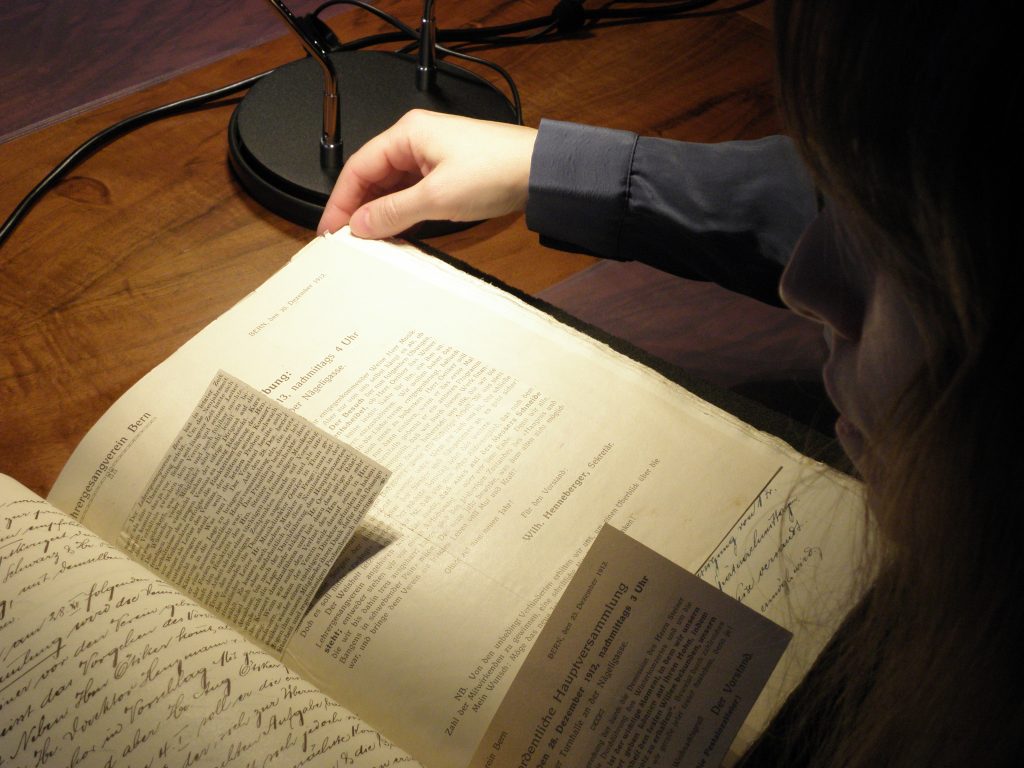
Dr Caiti Hauck at work on her research project. -
Radio interview: Choirs as builders of Swiss identity
In Switzerland, choirs not linked to the church flourished in the 19th century. How did they come into being? For what purposes? What impact did they have on the social and political life of the towns and cantons? How did they accompany the creation of modern Switzerland?
Listen online to Julien Magnollay’s interview with Caiti Hauck on Swiss Radio and Television (RTS) programme Tribu.
-
Night of Research: a festival of knowledge
On Saturday 10 September 2022, the University of Bern is pleased to invite you to another “Nacht der Forschung”. This event provides an insight into the research at the University of Bern – explained clearly and presented entertainingly. More than 700 researchers will present their work through interactive presentations and lectures.
CLEFNI could not stay out of this event and will participate in the “Nacht der Forschung” with two presentations:
- 5 p.m.: “Singing Cities: Choirs in Bern and Fribourg in the 19th Century” (in German). Main building, 2nd floor, room 206.
- 8 p.m.: “Knowledge from around the world: Speed dating with tomorrow’s top researchers” (in German). UniS, Underground, corridor with glass floor.
The “Nacht der Forschung” will take place between 4 p.m. and midnight on the Grosse Schanze, in the main building (Hauptgebäude), in ExWi and in UniS.
Visiting the “Nacht der Forschung” is free of charge.
-
21st Quinquennial Congress of the International Musicological Society
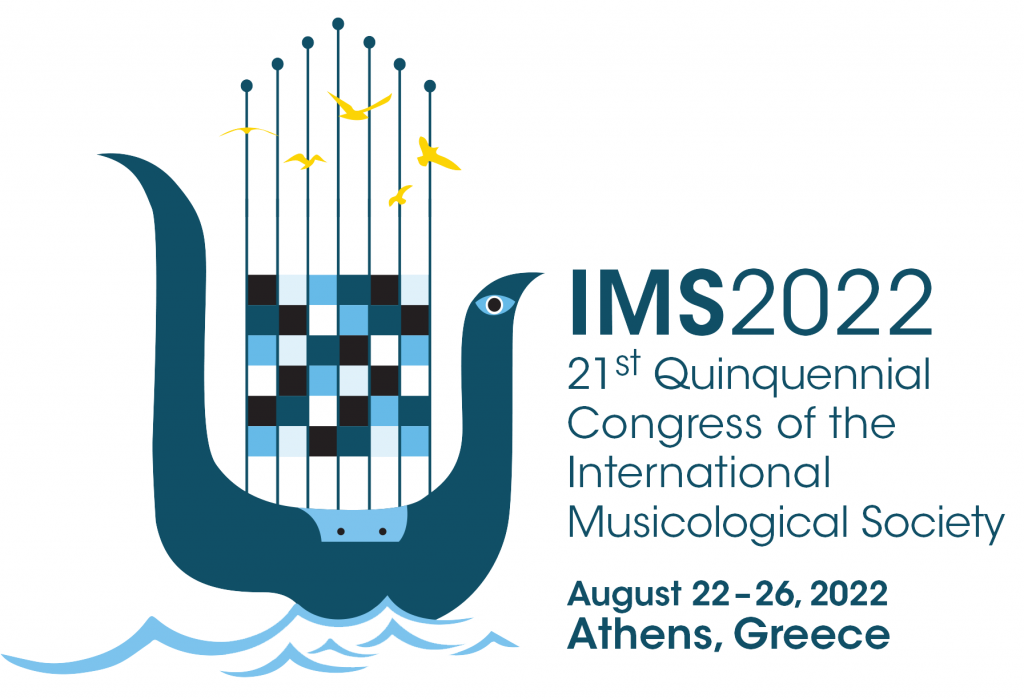
The 21st Quinquennial Congress of the International Musicological Society started yesterday in Athens and lasts until Friday.
On Thursday, Dr. Caiti Hauck will present partial results of CLEFNI in the paper “Male choral societies and multiculturalism in Switzerland in the long 19th century: the cities of Bern and Fribourg as case studies”.
-
Brazilian videocast presents CLEFNI
In this videocast produced by the Centro Cultural Larte Manaus (Larte Manaus Cultural Centre, Brazil), Caiti Hauck presents the project CLEFNI.
An interview for our Portuguese speaking fans!
CLEFNI is grateful to Wolfgang and Bete Böhler as well as the Bern City Archives for this opportunity!
-
Public lectures “Singing in the Canton of Fribourg”
The public lectures “Singing in the Canton of Fribourg (16th-21st century)”, organised by the Historical Society of the Canton of Fribourg, start tomorrow!
Six meetings with a total of 13 speakers and one illustrative concert will present aspects and highlights of the singing tradition in the Fribourg region.
CLEFNI will contribute to this event with a lecture given by Dr Caiti Hauck on the Repertoire and choral activities in the second half of the 19th century in the city of Fribourg. This lecture will take place on 20 January 2022 at 7 pm in the Aula of the Collège de Gambach in Fribourg.
Further information:
Programme
Registration -
“The Swiss choral scene cannot be lumped together”
The conference “Choral Life in Switzerland, 19th-21st Century” took place on the 17th and 18th September 2021 at the University of Bern. The programme included three keynote lectures, a round table and 14 contributions on the themes of choral institutions, activities, performances and works from several regions of Switzerland, at different eras and in varied contexts.
The Swiss Musical Journal has published an interesting report on the conference written by Wolfgang Böhler!
-
Registration deadline extended!
The registration deadline for the conference “Choral Life in Switzerland, 19th-21st Century” has been extended to 15 September 2021!
Check out the full programme below.
-
A groundbreaking event for Swiss choral music
Registration for the conference “Choral Life in Switzerland, 19th-21st Century” is open until Sunday!
17-18 September 2021, Universität Bern, Aula Muesmatt (Gertrud-Wokerstrasse 5, 3012 Bern)
-
Keynote Lecture 3: Prof. Beat Föllmi
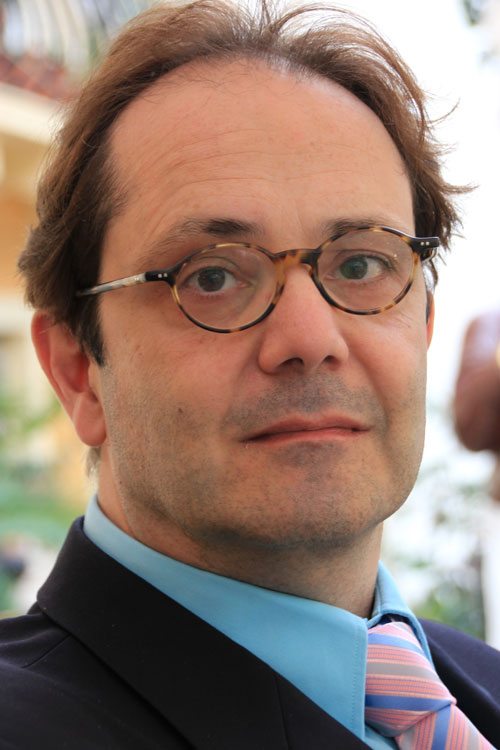
The third keynote lecture of the conference “Choral Life in Switzerland, 19th-21st Century” will be given by Professor Beat Föllmi (Université de Strasbourg, France).
Below you can read the English summary of his talk (the lecture will be given in German).
The choral works of Othmar Schoeck: from post-Romanticism to avant-garde and beyond
Othmar Schoeck (1886-1957) is first and foremost known as the “master of the Lied”, and more recently his operas have attracted attention. His choral work, however, has often been considered to be dictated by the straitened circumstances of the young composer and his need to earn a living. However, the publication of the volume containing the choral works (published in 2002) as part of the Complete Works has brought to light a varied and sometimes surprising body of work in the form of some 350 pages of scores. In addition to these compositions, written especially for a chorus (male or mixed), there are choruses inserted in the operas.
On his return from Leipzig in 1908, where he had studied with Max Reger, Schoeck took over the direction of several men’s choirs in Zurich, first the “Harmonie” choir and then those of the Aussersihl and the school teachers (Lehrergesangverein). He left these positions in 1918 after receiving an annual grant from the patron Werner Reinhart and after his election as conductor of the St. Gall Symphony Orchestra. It was during this period that Schoeck wrote some of his most important choral compositions: Postillon, op. 18 (Nikolaus Lenau), Dithyramben, op. 22 (Goethe), Wegelied, op. 24 (Gottfried Keller), and Trommelschläge, op. 26 (Walt Whitman).
Confronted with the avant-garde of the Vienna School at the Salzburg Festival in 1923, Schoeck completely changed his writing. The opera in one act Penthesilea(written between 1923-1925) testifies to this radical new approach; it includes bold passages for mixed chorus. But the reluctant reception he received from the public brought him back to reality. Once again the composer modified his writing, moving closer to neoclassical and neo-romantic styles. Two choral works from the beginning of the 1930s reflect this transformation: Die Drei, s. op. n°39 (Lenau), and Kantate, op. 49 (Eichendorff). Finally, the composer’s late style, from the 1940s onwards, is expressed in a number of accomplished choral works which mark a return Schoeck’s early work in this field, notably Für ein Gesangfest im Frühling, op. 54 (Keller), Vision, op. 63 (Keller), and Maschinenschlacht, op. 67a (Hermann Hesse).
It is no longer possible to claim that these choral compositions are the work of the young, post-Romantic Schoeck, followed by some late, imitative works. If we take opera choruses into account, it is clear that Schoeck wrote for choruses throughout his whole life – from the simplest a capellaforms to the most monumental ensembles, from almost “folk” writing to the use of vocal techniques borrowed from the avant-garde.
-
Keynote Lecture 2: PD Dre Delphine Vincent

The second keynote lecture of the conference “Choral Life in Switzerland, 19th-21st Century” will be given by PD Dre Delphine Vincent (Université de Fribourg, Switzerland).
Below you can read the English summary of her talk (the lecture will be given in French).
People’s choir and popular theatre at the Théâtre du Jorat
The Théâtre du Jorat was opened in Mézières in 1908. Up until 1947, the works performed there were exclusively plays written by its founder, writer René Morax, who was trying to develop popular Swiss-French dramatic art. Music played an important role in his plays. For both aesthetic and financial reasons, this music was often performed by amateur choirs.
Between 1908 and 1947, thirteen plays by Morax were created. The music for these plays was written by four composers: Gustave Doret (Henriette, Aliénor, La Nuit des Quatre-Temps, Tell, Davel, La Terre et l’Eau, La Servante d’Evolène), Arthur Honegger (Le Roi David, Judith, La Belle de Moudon, Charles le Téméraire), Frank Martin (Roméo et Juliette) and André-François Marescotti (La Lampe d’argile).
With the exception of the Honegger oratorios and a few choruses by Doret, this music is not well known today. At most, we remember the divergent points of view between Doret and Honegger and the factions that developed as a consequence. However, the constraints imposed by writing for amateurs and the stage music genre imply more shared stylistic points than one might be led to believe from the controversies between Doret and Honegger, who moreover were both campaigning for an art that addressed everybody directly.
We wish to identify the long-term elements of the choruses written for the Théâtre du Jorat in terms of the types of subjects (regional, religious, historical, everyday), the functions of the choruses (intradiegetic or commentary to the audience) and the compositional strategies. Balanced against the dissimilarities, it will thus be possible to establish the ways in which the choirs sung at the Théâtre du Jorat contributed to spreading a certain image of French-speaking Switzerland and to shaping the notion of popular music in Romandy.
-
Keynote Lecture 1: Prof. Friedhelm Brusniak
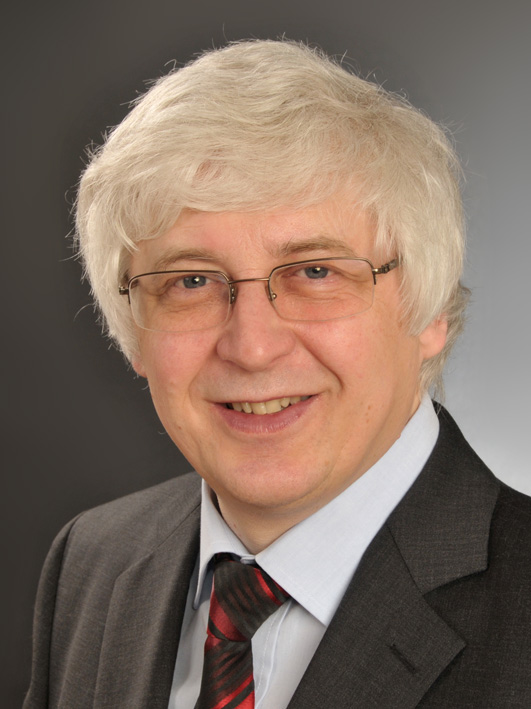
The first keynote lecture of the conference “Choral Life in Switzerland, 19th-21st Century” will be given by Professor Friedhelm Brusniak (Julius-Maximilians-Universität Würzburg, Germany).
Below you can read the English summary of his talk (the lecture will be given in German).
On the transition from the Liedertafel style to choral polyphony in the 19th and 20th centuries
On 6 June, 1903, Kaiser Wilhelm II gave a memorable speech on “The German Folk Song” following the second “Kaiserpreissingen” singing competition for the trophy he had donated for the contest between Germanmen’s choirs. He criticized what he believed to be the wrong choice of repertoire for amateur choirs and inadequate performance standards forsingers in virtuoso choral works. As a consequence, he announced that a collection of “all folk songs” that were “written, sung, and known in Germany, Austria, and Switzerland” would be compiled. A working committee and an advisory committee were immediately formed, with Friedrich Hegar (1841–1927) from Zurich also being appointed to the latter. The two large volumes of the “Folk song book for male choirs” (Volksliederbuch für Männerchor), which included 611 pieces and became known as the “Kaiser’s song book” (Kaiserliederbuch), were published as early as 1906, at the instigation of the German emperor. In 1915, the counterpart “Folk song book for mixed choirs” (Volksliederbuch für gemischten Chor) with 604 numbers was published, again with the contribution of Friedrich Hegar as a representative of Switzerland. The unique publishing project did not come to an end until 1930, with the multi-volume “Folk song book for young people” (Volksliederbuch für die Jugend), in which experts from Germany, Austria, Holland, and Switzerland were also involved.
But neither the “Kaiser’s song book” anthologies nor the forward-looking “Folk song book foryoung people” collection, now published by the State Commission, prevented a bitter debate breaking out in the 1920s. This debate was over a 19th-century style for male choirs, rightly or wrongly negatively described as the “Liedertafelstil”, and a new type of vocal polyphony, which was enthusiastically welcomed and accepted or disparagingly criticized as “polyphonitis”.
For some time, academic study had been intensifying onthe transition from the increasingly openly criticized, usually four-part homophonic “folk choir song” in the “Liedertafel” style by composers such as Franz Abt (1819–1885) and Ignaz Heim (1818–1880) to vocal works for “polyphonic male choirs” by Erwin Lendvai (1882–1949), who worked in Switzerland from 1935 to 1938 before emigrating. This work had already led to new discoveries and rediscoveries of unjustly forgotten choral music from an exciting period of upheaval in choral culture in the early 20th century.
-
Registration open!
The conference “Choral Life in Switzerland, 19th-21st Century” takes place on 17 and 18 September 2021 in the Aula Muesmatt of the University of Bern.
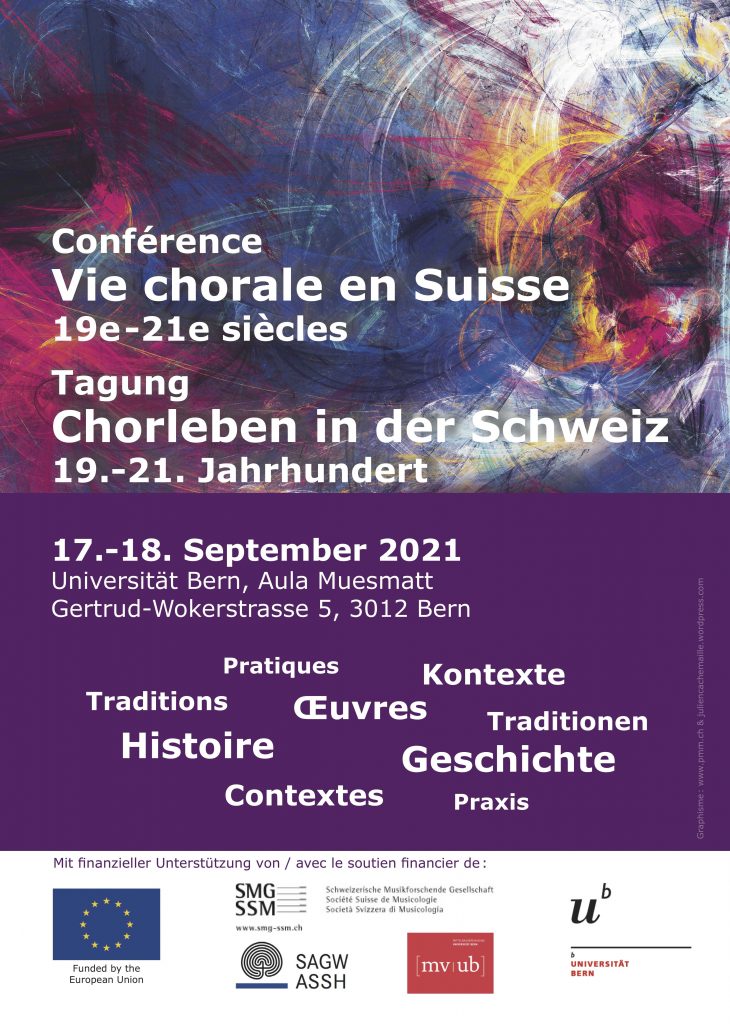
Keynote Lectures
- Professor Friedhelm Brusniak (Julius-Maximilians-Universität Würzburg, Germany): Zum Wandel vom Liedertafelstil zur Chorpolyphonie im 19. und 20. Jahrhundert
- PD Dr Delphine Vincent (Université de Fribourg, Switzerland): Chœur du peuple et théâtre populaire au Théâtre du Jorat
- Professor Beat Föllmi (Université de Strasbourg, France): Das Chorwerk von Othmar Schoeck: von der Postromantik zur Avantgarde und darüberhinaus
Round Table
- Composers: Leopold Dick and Jean-François Michel
- Moderation: Dr Irène Minder-Jeanneret, Dictionary of Music in Switzerland
Participation is free of charge. Register now, the number of places is limited!
-
CLEFNI and the Bern City Archives
The Bern City Archives has just published an article about CLEFNI!
“The Berner Liedertafel: a men’s choir with the best connections in politics” (in German)
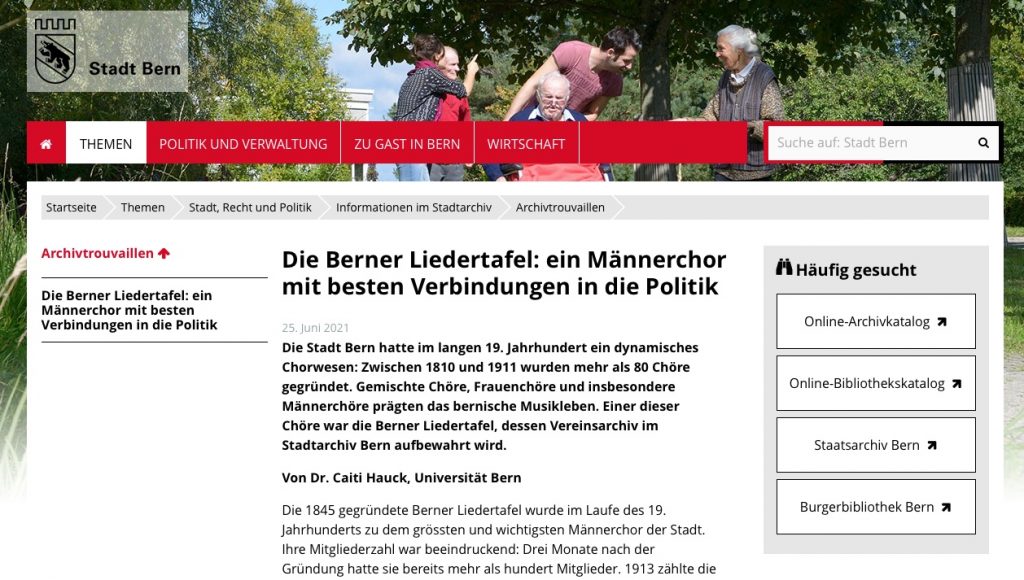
-
Conference “Choral Life in Switzerland, 19th-21st Century”: Extended CfP deadline
Choral Life in Switzerland, 19th-21st Century
International Conference
Institute of Musicology, University of Bern
17–18 September 2021
The Call for Papers is open!
Extended deadline for proposals: 31 January 2021
Keynote speakers
- Professor Friedhelm Brusniak, Julius-Maximilians-Universität Würzburg, Germany
- Professor Beat Föllmi, Université de Strasbourg, France
- PD Dr Delphine Vincent, Université de Fribourg, Switzerland
Conference Committee
Dr Caiti Hauck, CLEFNI, University of Bern
Dr María Cáceres Piñuel, University of Bern
Professor Cristina Urchueguía, University of Bern
-
Union Chorale La Mutuelle
The men’s choir La Mutuelle was founded in 1884 by Théodore Corboud in the Neuveville district of Fribourg.
Linked to the Saint-Jean Parish at the time of its creation, the choir provided religious services there until 1900. At the same time, it also devoted itself to secular music and took part in several singing festivals, mainly in the canton of Fribourg.
In 1958, its name was changed to Union Chorale La Mutuelle.
The photo below shows the choir during a walk on the Black Lake in 1905.
